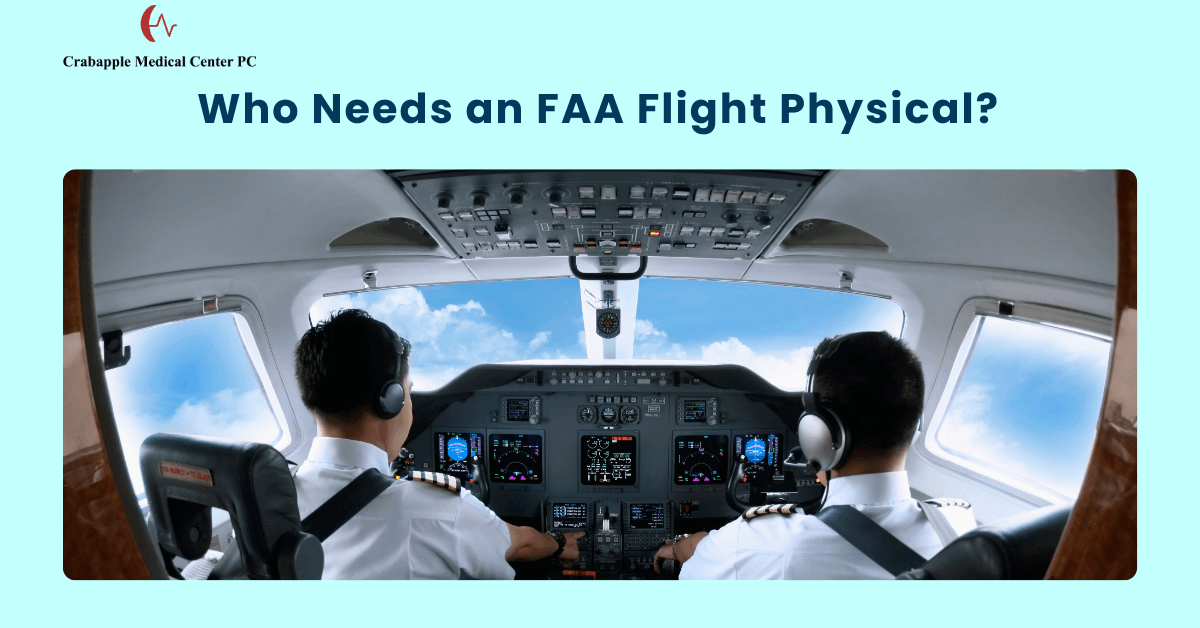If you’re pursuing a career as a pilot or already flying, understanding the importance of FAA flight physicals is crucial. The Federal Aviation Administration (FAA) mandates that all pilots pass a medical examination to ensure they are fit to operate an aircraft safely. At Crabapple Medical Center, we specialize in FAA-certified flight physicals to help you stay compliant with FAA regulations. Our team provides thorough evaluations, including vision, hearing, cardiovascular, and neurological assessments, ensuring you meet the health standards for Class 2 and Class 3 medical certifications. Whether you’re preparing for your first flight physical or need assistance with maintaining your medical clearance, Crabapple Medical Center is here to support your journey in aviation.
What is an FAA Flight Physical?
An FAA flight physical is a medical exam that ensures a pilot meets the health standards required by the FAA to safely operate an aircraft. These physicals are necessary for pilots of all categories, including commercial, private, and recreational pilots. The examination is conducted by an FAA-authorized physician, known as an FAA Medical Examiner (AME), who evaluates your medical history, vision, hearing, and overall physical and mental health.
The FAA flight physical’s primary goal is to ensure that pilots do not have any medical conditions that might impair their ability to control an aircraft, respond to emergency situations, or be aware of environmental factors such as weather or other hazards. These assessments are crucial to ensuring aviation safety for both the pilot and passengers.
At Crabapple Medical Center, we offer FAA-certified flight physicals to ensure that you meet the FAA’s medical regulations for Class 2 and Class 3 certifications. Our Flight Physicals ensure that you remain airworthy, with comprehensive assessments that include vision, hearing, cardiovascular, and neurological evaluations, along with necessary lab tests to certify your fitness for flight.

Who Needs an FAA Flight Physical?
Anyone who intends to fly an aircraft, whether for personal or commercial use, must undergo an FAA flight physical. The type of medical certificate you need depends on the type of flying you plan to do. The FAA issues three classes of medical certificates:
First-Class Medical Certificate
Required for airline transport pilots and those who operate as pilots in command of commercial airliners. This is the most rigorous type of medical certification, as it is designed to ensure that pilots can handle the demands of commercial flying, including long hours, complex flight operations, and high levels of responsibility.
Second-Class Medical Certificate
Required for commercial pilots who do not operate airliners, such as cargo pilots or flight instructors. While the requirements for this class are slightly less stringent than those for a first-class certificate, they are still rigorous to ensure pilots can safely operate their aircraft in a commercial capacity.
Third-Class Medical Certificate
Required for private pilots and those who fly for personal purposes. This certificate is typically easier to obtain but still ensures that pilots meet the necessary health and fitness standards to fly recreationally.
Each class has specific medical requirements that vary in their level of scrutiny based on the duties associated with the pilot’s role.
Get Certified for Flight with Crabapple Medical Center
Ensure you meet FAA standards and stay airworthy with our comprehensive flight physical exams.
What Happens During an FAA Flight Physical?
The FAA flight physical consists of several components that assess the pilot’s fitness to fly. The exam includes:
1. Medical History Review
The AME (Aviation Medical Examiner) will ask you about your medical history, including any conditions that might affect your ability to safely fly an aircraft. This could include past surgeries, mental health conditions, or ongoing treatments. It’s essential to be honest during this portion of the exam, as withholding information about a medical condition could result in your medical certification being denied or revoked.
Some common conditions that the AME will inquire about include:
- Heart disease or history of heart attacks
- High blood pressure
- Seizures or epilepsy
- Psychiatric conditions such as depression or anxiety
- Diabetes, particularly insulin-dependent diabetes
- Vision and hearing impairments
- History of strokes or neurological disorders
If you have any of these conditions, it doesn’t necessarily mean you won’t pass the medical exam. However, the AME may require additional testing or documentation to assess how the condition might affect your ability to fly safely.

2. Vision Test
A key part of the exam is testing your vision. The FAA requires that pilots have 20/40 vision, either with or without correction. This ensures that you can see critical instruments and navigate safely.
Additionally, the FAA requires that pilots can perceive colors necessary for the safe performance of airman duties. This is essential for reading instruments, navigating, and interpreting important visual signals while flying.
If you wear glasses or contact lenses, you’ll need to have them with you during the exam to ensure you meet the vision requirements. Pilots with corrective lenses can still obtain a medical certificate if their vision meets the standards.
3. Hearing Test
The AME will test your hearing to ensure you can understand radio communications and be aware of important in-flight sounds. The hearing test typically involves listening to a conversation or some basic sounds at a certain volume and being able to respond correctly. This ensures that a pilot can hear warnings, instructions, and communication during flight.
4. Physical Examination
This includes checking vital signs such as blood pressure, heart rate, and overall physical condition. The examiner will also look for any signs of illness or physical impairments that could interfere with your ability to fly. For instance, the AME may listen to your heart and lungs to check for abnormal sounds or murmurs.
A comprehensive physical exam is conducted to assess your general health and ability to tolerate the demands of flying. If you have any medical conditions, the AME may order additional tests or require a note from your doctor.
5. Psychological Evaluation
Pilots must be mentally fit to handle the stress and responsibility of flying an aircraft. If you have a history of mental health issues, the AME may request additional evaluations to assess your mental stability. This can include assessments of stress tolerance, emotional regulation, and overall psychological well-being.
Certain psychiatric conditions, such as severe depression, bipolar disorder, or psychosis, may disqualify a pilot from obtaining a medical certificate. However, individuals with mental health conditions may still be able to fly if they are well-managed and have clearance from a mental health professional.
6. Urine Test
A urine sample may be taken to check for any potential health problems, such as kidney issues or diabetes. The test can identify underlying conditions that might not be immediately apparent but could affect your health or ability to fly.
FAA Flight Physical Requirements
The specific requirements for passing an FAA flight physical depend on the class of medical certificate you are applying for. Below is a general overview of the basic health standards:
Vision
20/40 vision in each eye, with or without correction. Pilots must also have the ability to perceive colors necessary for the safe performance of airman duties.
Hearing
The ability to understand a normal spoken conversation and respond appropriately.
Cardiovascular Health
Pilots must not have any history of heart disease, uncontrolled high blood pressure, or other serious cardiovascular issues.
Mental Health
Pilots must be free from any psychiatric conditions that would impair their ability to perform their duties safely, such as severe depression, bipolar disorder, or psychosis.
Neurological Health
Pilots should not have a history of seizures, epilepsy, or other neurological disorders unless these conditions are well controlled.
Diabetes
Pilots with diabetes are generally required to have their condition well-managed, often with documented physician approval and monitoring.

Types of FAA Flight Physicals Provided by Crabapple Medical Center
At Crabapple Medical Center, we provide comprehensive flight physicals for all pilot categories, including FAA Class 2 and Class 3 flight physicals.
FAA Class 2 Flight Physicals
These are for commercial pilots who do not operate airliners. Crabapple Medical Center offers Class 2 flight physicals, which assess pilots for commercial flying by conducting vision, hearing, and cardiovascular evaluations, ensuring you meet the health standards required for professional aviation operations.
FAA Class 3 Flight Physicals
These are for private and recreational pilots. Crabapple Medical Center conducts thorough exams, including vision and general health assessments, to ensure safety and compliance with FAA guidelines for private and recreational flying.
What Happens If You Don’t Pass the FAA Flight Physical?
If you don’t pass the FAA flight physical, the AME may provide you with a temporary medical certificate or a denial. In some cases, the AME may allow you to provide additional documentation or undergo further testing to address any medical concerns. For example, if you have a history of a medical condition that could impact your ability to fly, the AME might require a specialist’s report or additional testing to evaluate your condition.
In some instances, the FAA may issue a special issuance medical certificate, which allows a pilot to fly despite certain medical conditions, if they meet specific criteria and provide additional documentation proving their condition is well-managed.
Preparing for Your FAA Flight Physical
To improve your chances of passing the FAA flight physical, here are a few tips:
Be Honest About Your Medical History
It’s important to be transparent with your AME about your medical history. Concealing medical conditions can result in a denial of your medical certificate, so it’s better to be upfront.
Get a Physical Check-up
Before scheduling your FAA flight physical, visit your regular healthcare provider for a general check-up. This can help identify any health concerns that may need to be addressed before your exam.
Know the Requirements for Your Medical Class
Familiarize yourself with the specific requirements for the class of medical certificate you’re applying for. This can help you understand what the AME will be looking for during the exam.
Manage Your Health
Maintain a healthy lifestyle by staying active, eating a balanced diet, and managing chronic conditions like high blood pressure or diabetes. Keeping your health in check will improve your chances of passing the exam.
Role of Crabapple Medical Center in Your FAA Flight Physical
At Crabapple Medical Center, we offer FAA-certified flight physicals that ensure you meet the health regulations for Class 2 and Class 3 medical certifications. Our Flight Physicals include thorough assessments, such as vision, hearing, cardiovascular, and neurological evaluations, along with lab tests to ensure your fitness for flight.
Whether you are preparing for your first FAA flight physical or need assistance with an existing medical condition, Crabapple Medical Center is here to support you. Our medical team provides clear guidance to help you pass your FAA flight physical and remain airworthy.
Your Path to Safe and Successful Aviation Starts Here
FAA flight physicals are a vital step in becoming and staying a qualified pilot. Whether you’re just beginning your aviation career or are a seasoned pilot, maintaining your medical certification is essential for safe flight operations. At Crabapple Medical Center, we’re dedicated to ensuring you meet the FAA’s health standards through comprehensive evaluations and expert care. Our team is here to guide you every step of the way, helping you stay airworthy and ready for takeoff. Let us help you achieve your aviation goals with confidence and safety.
Stay Ready for Takeoff
Schedule your FAA flight physical today and let us help you maintain a safe and successful aviation career.
Frequently Asked Questions
How often do I need to take an FAA flight physical?
The frequency of your FAA flight physical depends on the class of medical certificate you hold and your age. Typically, first-class certificates need to be renewed every 12 months, second-class certificates every 12 months, and third-class certificates every 5 years for pilots under 50. After age 50, third-class certificates need to be renewed every 2 years. For commercial pilots or pilots operating airliners, first and second-class certificates are required to be renewed annually.
How can Crabapple Medical Center help with FAA flight physicals?
Crabapple Medical Center specializes in providing FAA-certified flight physicals for pilots. Our team of experienced physicians offers comprehensive evaluations to ensure you meet the FAA’s medical standards for Class 2 and Class 3 certifications. We conduct thorough assessments, including vision, hearing, cardiovascular, and neurological tests, to certify your fitness for flight.
What should I expect during an FAA flight physical at Crabapple Medical Center?
During your FAA flight physical at Crabapple Medical Center, we will conduct a thorough assessment that includes a review of your medical history, a vision and hearing test, physical exam, and psychological evaluation if needed. Our medical team will ensure you meet the necessary standards for the medical class you’re applying for, providing clear feedback and recommendations.
What if I have a medical condition that could affect my FAA flight physical?
If you have a medical condition that might affect your FAA flight physical, it’s important to be upfront during your consultation. Conditions like diabetes, heart disease, or mental health issues don’t necessarily disqualify you from passing the exam, but you may need additional documentation or tests. Crabapple Medical Center will work with you to help manage these conditions and ensure you can still pass the medical exam with the necessary documentation or special issuance if required.
Can Crabapple Medical Center help me if I fail my FAA flight physical?
If you don’t pass your FAA flight physical, Crabapple Medical Center can assist you by offering advice and helping with additional testing or documentation. If necessary, we can help you apply for a special issuance certificate or direct you to the right specialists to address any concerns that may have caused a temporary disqualification.

